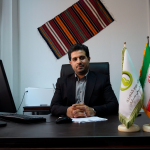| International Scientific Cooperation Office | |||
|
Director of ISCO : Dr Sajad Kiani Email: kiani.sajad@gmail.com Officer for International Branch: Majid Khoshrooz Email: M.khoshrooz@sanru.ac.ir Tel No: +981133687548 Fax No: +981133687548
|
|||
| International Scientific Cooperation Office The office opened as an independent directorate under the direct supervision of the Chancellor of the university in 2009. International scientific cooperation office coordinates sabbatical leaves and international conferences and assists with visas and other related matters. It also attempts to build ties with outstanding and talented Iranian professors who are working at foreign academic institutions in order to promote joint scientific activities with their counterparts within the country.In terms of international collaboration, ISCO was actively moving forward to establish a joint scientific cooperation between Sari Agricultural Sciences and Natural Resources University with other universities and research institutes from all around the globe and successfully invited committees and administration boards from several universities to have a formal visit from Sari University and subsequently signed Memorandum of Understanding (MoU) with those universities as follows: Educational, researchand technologymemorandums signedbetween Sari University andforeigncounterparts:Joint workshop between Sari University-Iran and IRRI-Philippine Signing MoU between Sari University-Iran and University Sains Malaysia (USM)-Malaysi Joint workshop between Sari University-Iran and Bochum University of Applied Sciences-Germany Signing MoU between Sari University-Iran and Astrakhan State University-RussiaSari Agricultural Sciences and Natural Resources University as a Member of Association of the Caspian Sea State Universities The Caspian Sea is the largest inland body of water in the world and accounts for 40 to 44% of the total lacustrine waters of the world. The coastlines of the Caspian are shared by Azerbaijan, Iran, Kazakhstan, Russia, and Turkmenistan. The Caspian is divided into three distinct physical regions: the Northern, Middle, and Southern Caspian. Sturgeon inhabit the Caspian Sea in great numbers, and yield roe (eggs) that are processed into caviar. Overfishing has depleted a number of historic fishes including economic exhaustion of the tuna fish.۱۴th meeting of the Association of the Caspian Sea State Universities in Daghestan-RussiaIn recent years overfishing has threatened the sturgeon population to the point that environmentalists advocate banning sturgeon fishing completely until the population recovers. Therefore, many of the marine science research and teaching institutions, shipbuilding factories, fishing and aquaculture, marine ecology and oil exploitation, etc. were formed in the former Soviet Union. After the collapse of the Soviet Union and formation of new independent states and loss of research solidarity related to the Caspian sea it was necessary to establish a union in order to unify the scattered educational and research institutes around the Caspian Sea.In fact, the idea of a union of universities around the Caspian Sea, now known as the Association of the Caspian Sea State Universities, and consequently the channel partnership culture, education and research in countries that border the sea has been founded based on multilateral benefits from the Caspian Sea. Sari Agricultural Sciences and Natural Resrouces University is a member of this association and was chosen as a focal point to establish the Caspian International Research Institute of Agricultural Biotechnology during the 12th meeting (2008) at Mazandaran University-Iran. ۱۴th meeting of the Association of the Caspian Sea State Universities in Daghestan-Russia |
|||

